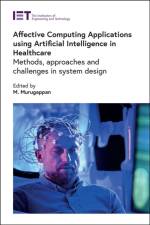- Methods, Approaches and Challenges in System Design
av M Murugappan
1 909,-
Affective computing is the study and development of systems and devices that can recognise human emotions. This can be done using sensing technologies and AI algorithms to process biological signals or facial images to identify the different affective states, such as happiness, anger, fear, surprise, sadness and disgust. This non-invasive technique has applications in healthcare such as emotional impairment detection, mental health assessment, emotional stress assessment, cognitive decline detection, attention deficit disorders, neurodegenerative diseases, neurological disorders, autism spectrum disorder, stress, anxiety or other behavioural assessment. This edited book provides an overview of the ongoing research on affective computing applications in healthcare using AI and IoT. This book covers recent advancements in computing technology, modelling methods, frameworks, and algorithms used for human affect detection using bio-signal and image processing methods. The book explores the use of EEG signals, thermal imaging, eye-movement patterns, gesture recognition systems and IoT systems to gather information and discusses the use of deep learning, CNN and RNN-LSTM models of how this information can be usefully processed to detect emotional states. Discussing the latest trends and developments in research in the field, this book is a useful resource for researchers in affective computing, affective neuroscience, cognitive neuroscience, computer vision, signal and image processing, cybersecurity, AI/ML/DL, data science, HCI, sensing and robotics. Practicing physicians, clinical experts or researchers in experimental and applied cognitive psychology who wish to understand the emotional wellbeing (pain and stress level analysis) of patients may also find this book of interest.






























